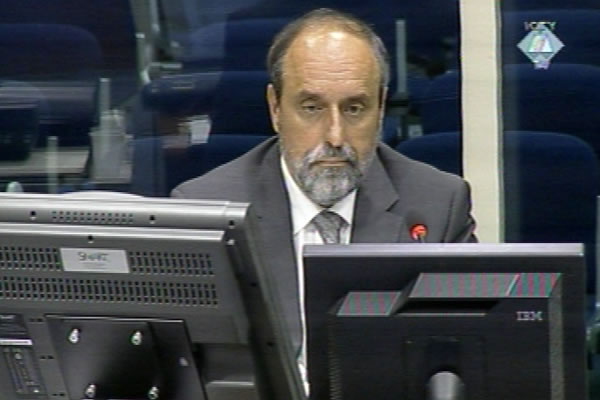Home
PRIORITIES SET BY HADZIC’S GOVERNMENT
The prosecution has suggested that as far as the investigation bodies in the Serb Autonomous Region of Slavonia, Baranja and Western Srem were concerned, the priority was to prosecute crimes against Serbs, rather than those involving non-Serb victims. The prosecution showed 29 documents from the Beli Manastir court, in order to prove that only 13 judgments were rendered in cases involving Serb perpetrators. The rest of the cases, 16 in all, never proceeded beyond indictment
 Goran Hadzic testify in his own defence
Goran Hadzic testify in his own defence On the eighth day of Goran Hadzic’s cross-examination, former prime minister of the Serb Autonomous Region of Eastern Slavonia, the prosecution focused on the failure of the accused to prevent crimes and punish perpetrators in Slavonia, Baranja and Western Slavonia, and the rest of the Republic of Serbian Krajina. As alleged in the indictment, Hadzic thus contributed to the implementation of a joint criminal enterprise whose goal was to forcibly and permanently eliminate non-Serbs from large parts of the Croatian territory which were claimed by the Serbs.
Prosecutor Douglas Stringer suggested that the authorized bodies in the SAO Eastern Slavonia and the Republic of Serbian Krajina either didn’t prosecute those who had been indicted or the judgments did not fit the crimes. In some cases, the perpetrators were acquitted. According to the documents admitted into evidence, out of 29 cases brought before the Beli Manastir court, the judgments were rendered in just 13 cases. In 16 cases, the proceedings didn’t progress beyond the indictments. Just two cases pertain to the crimes from 1991 – when the gravest crimes listed in the indictment had been committed – while the other cases dealt with the crimes committed in 1992.
Quoting from a judgment in which an accused was sentenced to 18 months in prison for murder, the prosecutor asked Hadzic if he ‘as a human being’ found such an outcome fair. Hadzic didn’t answer because the defense counsel objected to the question.
The prosecutor also referred to a memo from 1992 sent by UNPROFOR commander Satish Nambiar to the undersecretary for peace operations Marrack Golding. The document notes that UNPROFOR conveyed its concerns to Hadzic about the violations of the Vance-Owen plan and the continued expulsion of non-Serbs. Hadzic told the UN representatives that he had issued ‘precise instructions to prosecute criminals’. Hadzic also told the UN that the crimes against non-Serbs were just as serious as the crimes against Serbs. According to the prosecutor, there was a system establishing priorities that did not include crimes against non-Serbs. Hadzic explained that the contents of the document were exaggerated and that he ‘wasn’t authorized’ to issue such instructions. He only conveyed the ‘Krajina government’s political stance which was to protect non-Serbs’.
The prosecutor then brought up a document issued by the district public prosecutor’s office in Dalj in December 1991, which was sent to Hadzic’s government. According to the document, the investigations of the crimes against Serbs were set as the priority for the bodies involved in the investigations. According to another document from the Dalj public prosecutor’s office, the murder of two Serbs in Borovo Naselje was qualified as a crime against humanity and genocide. The cases with Croat victims were not qualified as such, the prosecutor noted. Hadzic replied that for him, all murders were ‘the same’, yet he agreed that no crime against Croats had been qualified as crimes against humanity or genocide.
Goran Hadzic’s cross-examination will be completed tomorrow. After that the defense will use the nine hours it has been allotted for re-examination to correct the impressions left by some of the statements made by the first defense witness.
Linked Reports
- Case : Hadzic
- 2014-08-26 HADZIC: POLITICAL UNTRUTHS ARE NOT LIES
- 2014-08-25 SERB MAJORITY ACHIEVED BY MAKING NON-SERBS LEAVE AND SETTLING SERBS
- 2014-07-24 HADZIC’S ‘POLITICAL GAMES’
- 2014-08-28 HADZIC WORE UNIFORM FOR REASONS OF HYGIENE
- 2014-09-01 DID HADZIC THREATEN OR PROTECT INVESTIGATOR?
- 2014-09-02 WHAT HADZIC ACTUALLY MEANT TO SAY
